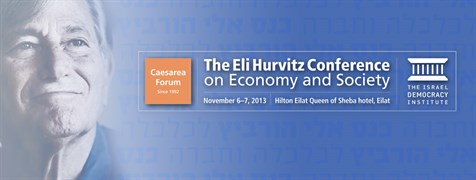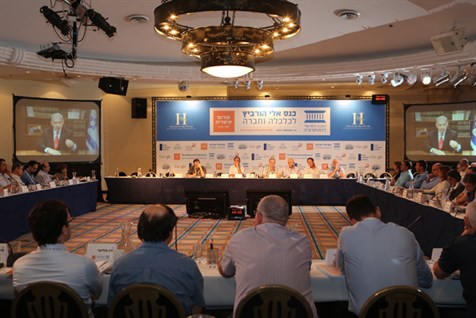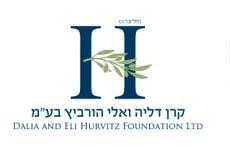The Eli Hurvitz Conference on Economy and Society 2013
The Hilton Queen of Sheba Hotel, Eilat
Participation is by invitation only.


On November 6–7, 2013, IDI convened the second Eli Hurvitz Conference on Economy and Society. Formerly known as the Caesarea Economic Policy Planning Forum, the conference fosters open discussion between senior government decision-makers and leading figures in academia, the non-profit sector, and the business world. This event was broadcast live on the IDI website with simultaneous English translation of the plenary sessions.
This conference is made possible by the generosity of
The Dalia and Eli Hurvitz Foundation.

In cooperation with:
 |
 |
 |
 |
 |
The Eli Hurvitz Conference on Economy and Society (formerly the Caesarea Economic Policy Planning Forum), which convened in 2013 for the 21st time, has established a unique tradition of professional, responsible, in-depth, and impartial discussion of the core issues in Israeli economic life. The annual conference is the culmination of comprehensive work conducted over a period of months by a federation of the leading research institutes in Israel. This work includes meetings of heterogeneous teams of experts, sessions with decision makers, intensive research, and the formulation of conclusions and recommendations that are distributed to policy makers and conference participants prior to the conference.
The conference brought together government ministers, public officials, senior bank executives, the top echelon of the Ministry of Finance and the Health Ministry, ministers and Knesset members, members of academia, chairs of public committees, leading figures in the business sector (chairs and CEOs of corporations, conglomerates, and associations), journalists, and guests from abroad, who attended plenary sessions, workshops, formal meetings, and informal meetings and rolled up their sleeves to make an impact on the economic and social fortitude of the State of Israel.
Three main principles guided the work of the working groups prior to the conference and the planning of the conference itself. The first and most important was to strengthen the impact of the output of the conference on decision makers in Israel by having the research teams closely study the selected issues and submit reports designed to benefit decision makers in their daily work. The second principle was a decision to examine each of the core issues studied—education, health, innovation, civil service, and employment and productivity—over a period of five years, with the aim of generating output that reflects comprehensive and long-term thinking. The third principle is the goal to innovate, since the uniqueness of the working groups is their ability to mobilize professional and experienced forces and make recommendations that are innovative from the perspective of decision makers. The conference itself offered an additional opportunity to emphasize and reinforce these three principles through plenary sessions and workshops in which decision makers of various echelons themselves participated.
The 2013 conference concentrated on five subjects:
- Toward a New Paradigm in Israeli Education: The working group, headed by Prof. Dan Inbar and the Van Leer Jerusalem Institute, focused on the teacher workforce and addressed two subjects:
- The policy of teacher training, professional development, and the processes of certification and work relations in an era of profound societal changes.
- The management of the teacher workforce in the education system and the definition of the roles, authorities, and responsibilities involved in managing teaching personnel.
- Inequality – It’s Bad for Our Health: The working group, headed by Prof. Orly Manor and the National Institute for Health Policy Research (NIHP) studied the national costs attributable to the failure to narrow the ongoing inequalities in health. The working group was able to quantify the costs stemming from the ongoing health disparities, which affect numerous national systems and not only the health system. It proposed ideas that would lead to a reduction in these inequalities, with an emphasis on models that would be economically sustainable from a national perspective.
- When the Start Up Nation Matures: Innovative environments are characterized by decentralized knowledge and multiple sources that put innovation processes into practice. The working group, led by Dr. Leonid Bakman and the Israel Innovation Institute, focused on the steps needed to transform the State of Israel into a state that fosters a systematic and planned culture of innovation, as opposed to spontaneous innovation based mainly on the talents of outstanding individuals. The team also addressed the need to institutionalize cross-sector activity in order to sustain the Israeli innovation engine and continue to develop it.
- Charting a New Course for Israel’s Civil Service: The working group focused on the steps required to strengthen the governance of the civil service and on the mechanisms for organizing the management of work relations in the service. Two sub-groups worked in this team:
- A team led by Mr. Ilan Levin studied flexibility in work relations and management, and focused on work relations in the civil service
- A team led by Dr. Gayil Talshir and Mr. Ron Tzur in collaboration with the Federmann School of Public Policy and Government at the Hebrew University of Jerusalem examined integration and inclusion in the civil service and discussed the possibility of a new paradigm of governance that is different than that of a welfare state or free market state.
- From Encouraging Employment to Boosting Productivity: The working group, headed by Prof. Michel Strawczynski, discussed productivity and the desired policy for boosting growth. The report that was prepared for the conference indicates that while the current policy for encouraging productivity – "from welfare to employment" – has indeed increased employment, some of the new employees are characterized by particularly low productivity. Therefore, its recommendation is to transition to a policy of “from employment to productivity.” The team focused on the demographic aspect and primarily on boosting the productivity of weak populations in the society.
It may be noted that Education Minister Rabbi Shay Piron and Minister of Intelligence Dr. Yuval Steinitz were not able to attend the conference.
Note: For workshop participants please see the Workshop Supplement in the Full Program.
Presidium:
- Mr. Yarom Ariav, Conference Director
- Dr. Arye Carmon, President, The Israel Democracy Institute
Government:
- Prime Minister Benjamin Netanyahu (via video)
- Minister Yael German, Health Minister
- Minister Yair Lapid, Finance Minister
- Minister Naftali Bennett, Economy Minister
- Minister Silvan Shalom, Minister of Energy and Water
Special Guests:
- Dr. Karnit Flug, Governor-Designate of the Bank of Israel (via video)
- Prof. Moran Cerf, Professor of Neuroscience, Department of Neurosurgery, NYU and UCLA; Kellogg School of Management
Education
- Prof. Dan Inbar, Senior Research Fellow, The Van Leer Jerusalem Institute
- Dr. Varda Shiffer, Research Fellow, Education and Privatization and Regulation, The Van Leer Jerusalem Institute
- Dr. Amnon Karmon, Research Fellow, Education, The Van Leer Jerusalem Institute
- Prof. Dirk Van Damme, Head of the Innovation and Measuring Progress (IMEP) Division, Directorate for Education and Skills, OECD
- Mr. Eli Hurvitz, Executive Director, The Trump Foundation
- Ms. Shirin Natour-Hafi, Principal, ORT Arab Science and Technology High School, Lod
- Mr. Eran Cohen, Director of Education, Budget Division, Ministry of Finance
- MK Amram Mitzna, Chair, Knesset Education, Culture and Sports Committee
Health
- Minister Yael German, Minister of Health
- Prof. Orly Manor, Professor of Biostatistics, Braun School of Public Health and Community Medicine, The Hebrew University-Hadassah
- Mr. Moshe Kahlon, Chair, Center for Reform & Leadership, Netanya Academic College
- Ms. Camila Vammalle, Senior Economist/Policy Analyst, Budgeting and Public Expenditures Division, OECD
- Mr. Chaim Oron, Chair, Lobby for Public Health
- Dr. Eyran Halpern, M.D., M.P.A., CEO, Rabin Medical Center; Chair, Hospital Directors Organization
- Dr. Bishara Bisharat, M.D., M.P.H., Head of Nazareth Hospital EMMS; Chair, Arab Health Association
- Prof. Shlomo Mor-Yosef, Director General, National Insurance Institute of Israel
Innovation
- Minister Yair Lapid, Minister of Finance
- Minister Naftali Bennett, Minister of Economy
- Dr. Leonid Bakman, Founder and Executive Director, Israel Innovation Institute
- Mr. Ron Huldai, Mayor of Tel Aviv-Yafo
- Mr. Amit Lang, Director General, Ministry of Economy
- Ms. Galit Hemi, Editor, Calcalist
- Mr. Eli Defes, Director General, Clalit Health Services
- Mr. Imad Younis, President, Alpha Omega
- Prof. Eugene Kandel, Head of the National Economic Council, Prime Minister’s Office
- Mr. David (Dadi) Perlmutter, Executive Vice-President, Intel Corporation
Public Service
- MK Mickey Levy, Deputy Minister of Finance
- MK Nissan Slomiansky, Chair, Knesset Finance Committee
- MK Dr. Ahmad Tibi, Deputy Speaker of the Knesset
- Mr. Ilan Levin, Economic Consultant; Head of Labor and Human Resources Division, Manufacturers Association of Israel; Former Head of Wages, Ministry of Finance
- Dr. Gayil Talshir, Head, Top Civil Servants MA Program in Public Policy, School of Public Policy, Department of Political Science, The Hebrew University of Jerusalem
- Mr. Ron Tzur, Chief of Staff, Reform Implementation Project, Israel Civil Service
- Mr. Ehud Praver, Deputy Director General for Governance and Social Affairs, Prime Minister’sOffice
- Mr. Ori Yogev, Director General, Israel Government Companies Authority
- Mr. Moshe Dayan, Adv., Civil Service Commissioner
- Mr. Kobi Amsalem-Shalev, Adv., Director General, Wages and Labor Agreements, Ministry of Finance
- Mr. Ronnie Bar-On, Adv., Former Minister of Finance
Macroeconomics
- MK Prof. Avishay Braverman, Chair, Knesset Economic Affairs Committee
- Prof. Michel Strawczynski, Department of Economics and Public Policy, The Hebrew University of Jerusalem; Head of Economics and Society Program, The Van Leer Jerusalem Institute
- Mr. Sever Plocker, Chief Economic Editor, Yedioth Ahronoth
- Mr. Zvi Oren, President, Manufacturers Association of Israel; Chairman, The Federation of Israeli Economic Organizations
- Prof. Nathan Sussman, Director, Research Department, Bank of Israel
- Ms. Michal Tzuk, Senior Deputy Director General, and Director of Employment Regulation, Ministry of Economy
- Mr. Moshe Bar Siman Tov, Deputy Director of Budgets, Ministry of Finance
- Mr. Imad Telhami, Founder and Chairman, Babcom Centers
Google Big Tent
- Mr. Doron Avni, Senior Policy & Government Relations Manager, Middle East, Sub-Saharan Africa, Israel & Turkey, Google
- Mr. Noam Bardin, Chief Wazer, Google
- Mr. Meir Brand, Managing Director, Google Israel, South Africa & Greece
- Mr. Vint Cerf, Chief Internet Evangelist and VP, Google
- Mr. Amit Lang, Director General, Ministry of Economy
- Ms. Carmela Avner, Government Chief Information Officer
- Mr. Yossi Katribas,Deputy Director General, Prime Minister's Office
- Mr. Amir Teig, Editor, Technology, Communications and Media, TheMarker
- Ms. Dana Weiss, Channel 2 News
Toward a New Paradigm in Israeli Education (Full Report)
From Encouraging Employment to Boosting Productivity (Abstract)
Inequality: It's Bad for our Health (Full Report)
When the Start Up Nation Matures (Abstract)
Charting a New Course for Israel's Civil Service (Abstract)
Download the full book of conference materials for the 2013 conference.
Highlights of the 2013 conference included:
- An address by Prime Minister Benjamin Netanyahu (via video)
- An interview with Bank of Israel Governor-Designate Dr. Karnit Flug (via video)
- An address by Health Minister Yael German
- An address by Finance Minister Yair Lapid
- An address by Minister of the Economy Naftali Bennett
- An address by Minister of Energy and Water Silvan Shalom
- An address by Mr. Ron Huldai, Mayor of Tel Aviv-Yafo
- A Google Big Tent event that featured Doron Avni, Google's Senior Policy and Government Relations Manager for the Middle East; Meir Brand, head of Google Israel; Vint Cerf, Chief Internet Evangelist and Vice President of Google; Noam Bardin, Google's Chief Wazer, and a panel of experts who discussed how the State of Israel can boost technological innovation and how principles of innovation from the world of the Internet can be adopted for the good of Israeli society. This event was sponsored in partnership with Google.
International figures who addressed the plenum in English included:
- Prof. Dirk Van Damme, Head of the Innovation and Measuring Progress (IMEP) Division of the OECD's Directorate for Education and Skills
- Ms. Camila Vammalle, Senior Economist and Policy Analyst of the OECD's Budgeting and Public Expenditures Division.
In addition, Prof. Moran Cerf, a Professor of Neuroscience from the Department of Neurosurgery at NYU and UCLA and the Kellogg School of Management presented a lunchtime lecture.
Prime Minister Netanyahu's Video Address
- Netanyahu: Cartels and monopolies are choking competition in Israel (Haaretz)
- Netanyahu calls for 4-5% economic growth for a decade (Jerusalem Post)
- Netanyahu Calls for Economic Growth to Fund Defense (Hamodia)
- Netanyahu wants more competition, fewer 'monopolies' (Yisrael Hayom')
The Governor of the Bank of Israel's Video Address
- Bank of Israel Governor Feels Pressure to Keep Rates Low (Wall Street Journal)
- BOI Governor Says Bank under Pressure to Keep Rates Low (Nasdaq)
- Israel's Flug Says Currency Market Overshot in Reaction to Gas (Business Week)
- Israel rates to stay low while global policy expansionary: Flug (Reuters)
- Flug: Good public services mean high taxes (Globes)
- Bank of Israel Wants to Streamline All Israeli Banks (Arutz Sheva)
Health Minister Yael German's Address to the Plenary
The Finance Minister's Address
- Lapid does about face on corporate tax break (Jerusalem Post)
- Lapid: Trickle down economics doesn't work (Globes)
- Lapid's economic vision: Tax breaks, innovation-based economy (Ynet English)
From the Plenary
All plenary sessions of the 2013 Eli Hurvitz Conference on Economy and Society are available for viewing on demand with simultaneous English audio translation.
